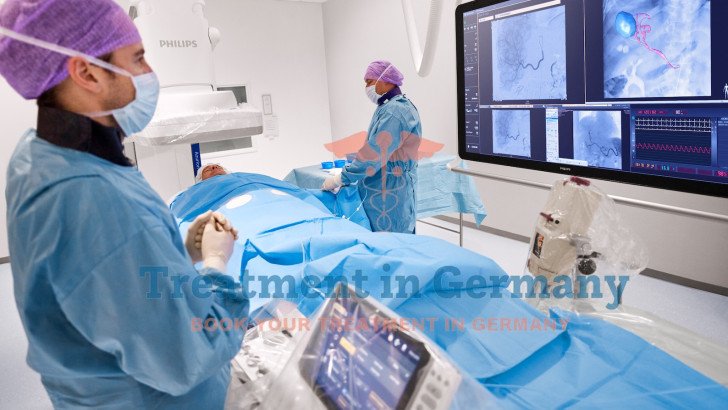
Lutetium Lu-177 PSMA therapy, a cutting-edge targeted radioligand therapy, is transforming the landscape of advanced prostate cancer treatment by delivering precise radiation to cancer cells
Prostate cancer, a prevalent malignancy among men, demands innovative approaches to enhance outcomes for prostate cancer patients. Lutetium Lu-177 PSMA therapy, a cutting-edge targeted radioligand therapy, is transforming the landscape of advanced prostate cancer treatment by delivering precise radiation to cancer cells. Germany, a global leader in innovative prostate cancer care, is at the forefront of implementing this therapy, attracting patients worldwide.
Prostate cancer originates in the prostate gland, often progressing slowly but becoming aggressive in advanced stages, particularly when it metastasizes to bones or lymph nodes. Risk factors include age, obesity, genetic mutations (e.g., BRCA1/2), and family history. Advanced prostate cancer, especially metastatic castration-resistant prostate cancer (mCRPC), is challenging to treat with conventional therapies like surgery or hormone therapy. Lutetium Lu-177 PSMA therapy targets prostate-specific membrane antigen (PSMA) on cancer cells, offering a novel solution. German oncology centers and nuclear medicine departments lead in integrating this targeted radioligand therapy to achieve superior survival outcomes.
Early detection of prostate cancer symptoms is crucial for effective treatment. Common signs include:
These symptoms may overlap with benign conditions like benign prostatic hyperplasia, necessitating advanced diagnosis. German specialists employ cutting-edge tools to ensure accurate identification, enhancing treatment outcomes.
Advanced Diagnostic Innovations for Prostate Cancer
Precise diagnosis is the cornerstone of effective prostate cancer treatment, particularly for Lutetium Lu-177 PSMA therapy. Germany’s nuclear medicine departments utilize state-of-the-art diagnostic innovations:
German radiologists and oncologists deliver meticulous diagnostic innovations, enabling personalized standards of care for prostate cancer patients.
Germany’s Leadership in Lutetium Lu-177 PSMA Therapy
Germany’s innovative prostate cancer care ecosystem is redefining treatment for advanced prostate cancer, particularly mCRPC, through Lutetium Lu-177 PSMA therapy. Oncology centers combine this therapy with multidisciplinary approaches to optimize survival outcomes.
Mechanism of Lutetium Lu-177 PSMA Therapy
Lutetium Lu-177 PSMA therapy is a targeted radioligand therapy that delivers beta-emitting radiation directly to PSMA-expressing cancer cells. The process includes:
German nuclear medicine specialists ensure precision, minimizing side effects and enhancing anti-tumor efficacy.
Integration with Other Cancer Treatments
Lutetium Lu-177 PSMA therapy is often combined with other therapies to improve prognosis:
This multidisciplinary cancer care, led by German oncologists and nuclear medicine specialists, maximizes treatment outcomes.
Advancements through Clinical Trials
Germany’s leadership in clinical trials for prostate cancer provides access to novel cancer treatment innovations, often unavailable elsewhere. Trials in 2025 explore:
German oncology centers drive global research, advancing innovative prostate cancer care.
Why Germany Excels in Prostate Cancer Treatment
Germany offers unmatched advantages for prostate cancer patients seeking Lutetium Lu-177 PSMA therapy:
Risk Factors and Prevention Strategies for Prostate Cancer
Preventing prostate cancer supports treatment efforts. Key risk factors include:
German specialists recommend regular screenings (PSA tests, MRI), healthy diets, and exercise to reduce disease risk.
Comprehensive Multidisciplinary Cancer Care
Germany’s multidisciplinary cancer care ensures holistic prostate cancer treatment:
This integrated approach, led by German urologists and oncologists, optimizes anti-tumor efficacy.
Post-Treatment Support and Elevating Quality of Life
After Lutetium Lu-177 PSMA therapy, German oncology centers provide comprehensive follow-up:
Germany’s patient-centric approach ensures prostate cancer patients achieve sustained recovery.
Challenges and Future Horizons
Lutetium Lu-177 PSMA therapy faces challenges, including tumor resistance and limited PSMA expression in some patients. German researchers address these through:
Future innovations, including combination immunotherapy and personalized radioligands, promise to enhance survival outcomes.
Conclusion
Germany’s innovative prostate cancer care is transforming prostate cancer treatment with Lutetium Lu-177 PSMA therapy, offering hope for prostate cancer patients with advanced disease. By integrating targeted radioligand therapy, immunotherapy, and clinical trials, German oncology centers deliver precise, transformative cancer treatment innovations. Supported by world-class specialists and cutting-edge technology, Germany ensures exceptional survival outcomes and quality of life. As a global leader in standards of care, Germany provides a lifeline for prostate cancer patients, blending scientific excellence with compassionate support.
Frequently Asked Questions
What is Lutetium Lu-177 PSMA therapy for prostate cancer in Germany?
It’s a targeted radioligand therapy delivering radiation to PSMA-expressing cancer cells, offered at German oncology centers.
What are common prostate cancer symptoms?
Symptoms include urinary issues, pelvic pain, blood in urine, and fatigue, requiring prompt diagnosis.
How is prostate cancer diagnosed for PSMA therapy in Germany?
Through PSMA PET-CT, MRI, biopsies, and molecular profiling at German hospitals.
Are clinical trials for PSMA therapy available in Germany?
Yes, German oncology centers explore alpha-emitters and combination therapies.
Is follow-up care provided after PSMA therapy in Germany?
Yes, including PSMA PET-CT, rehabilitation, and emotional wellness support.
How does Germany compare to the UK/US for prostate cancer treatment?
Germany leads in cancer treatment innovations, faster access, and holistic care.
Can PSMA therapy prevent prostate cancer recurrence?
Lutetium Lu-177 PSMA therapy reduces recurrence risk by targeting metastatic cells.
Does Germany support international prostate cancer patients?
Hospitals in Germany offer language assistance, travel coordination, and emotional wellness programs.
What are the latest advancements in PSMA therapy in Germany?
Germany pioneers alpha-emitting therapies, AI-driven dosing, and immunotherapy integration.
How does PSMA therapy differ from standard chemotherapy?
Unlike chemotherapy, Lutetium Lu-177 PSMA therapy offers targeted anti-tumor efficacy with fewer side effects, enhancing quality of life.
For more information or a free consultation, visit our contact us page.
Kindly complete the form below, and our dedicated team will reach out to you promptly. We look forward to connecting with you soon!
Trierer Straße, 56072 Koblenz, Germany

.webp)
 (1).webp)

.webp)
 (1).webp)


.webp)
 (1).webp)

.webp)
 (1).webp)
